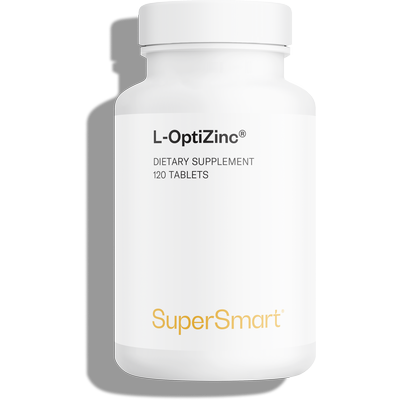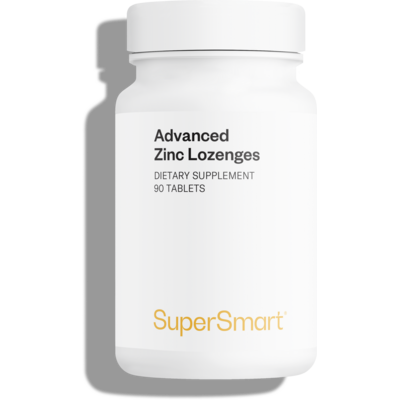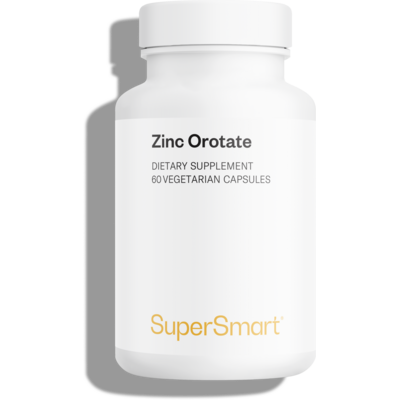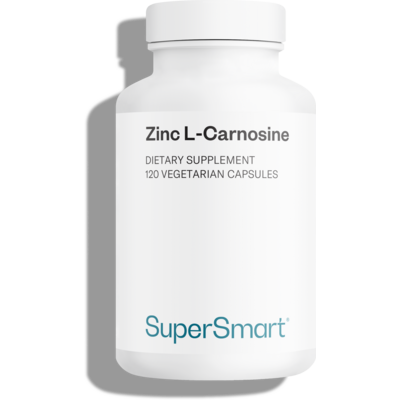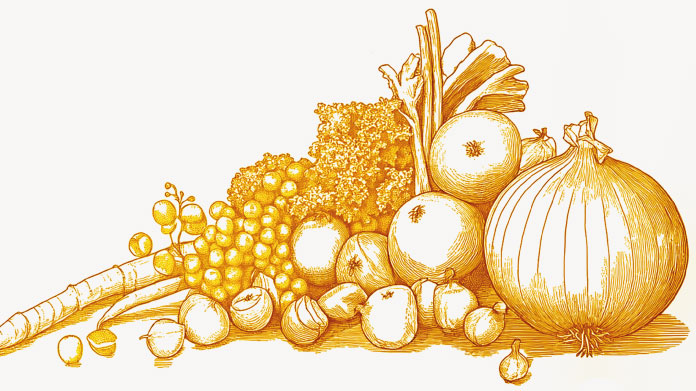Zinc supplements: how long should you take them for?
Not sure how long a course of zinc supplements should last? Here’s a summary, by health issue, of the durations and doses required for effective supplementation.
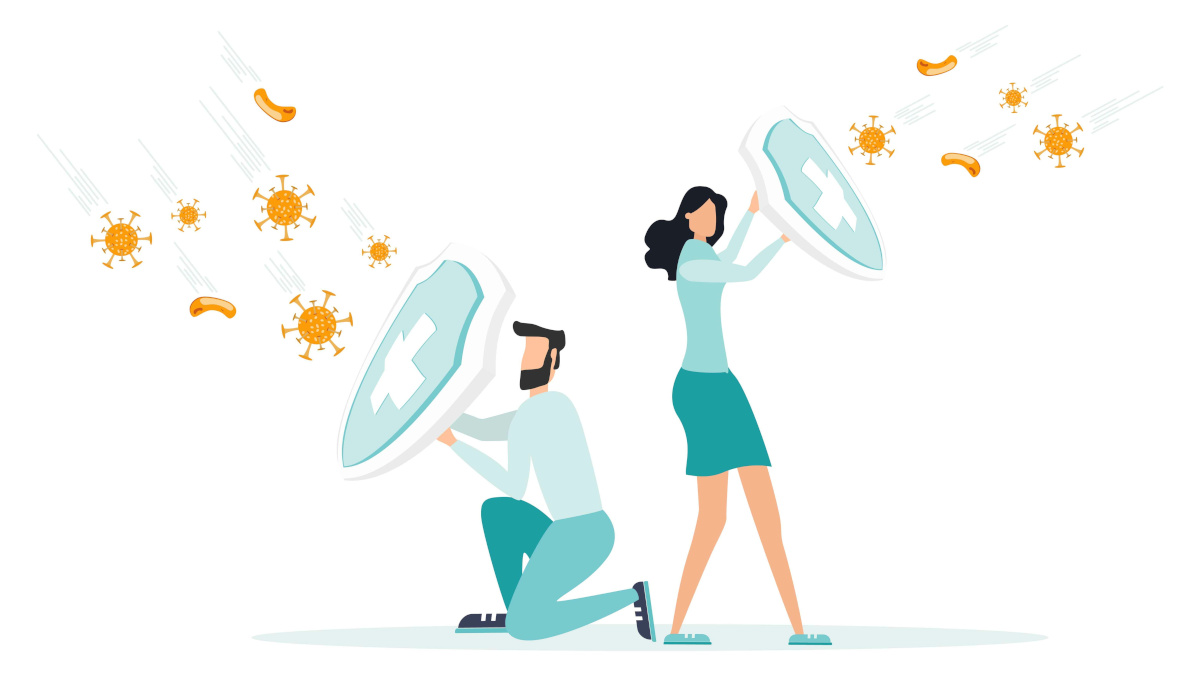
Zinc supplementation: what are the benefits?
Zinc is an essential trace element thought to be involved in more than 300 different enzymatic reactions. In particular, it plays a role in:
- the metabolism of macronutrients (proteins, carbohydrates, fatty acids);
- normal immune system function (1);
- normal fertility and reproduction, and in maintaining normal blood testosterone levels(2);
- maintaining healthy skin, hair,nails and bones(3);
- maintaining healthy vision(4);
- normal cognitive function(5);
- protecting cells against oxidative stress(6);
- and normal DNA synthesis.
Zinc cannot be produced by the body and must therefore be provided by our diet. Oysters, wheatgerm, beef, and sesame and pumpkin seeds are among the best sources.
Zinc intake and deficiency: the optimal dose
The recommended daily intake for zinc is around 11mg-12mg for men and 8mg-10mg for women (which corresponds to the amount in our zinc supplement Advanced Zinc Lozenges, suckable lozenges which provide 10mg of elemental zinc a day, and which should be taken for 2-3 months to boost your levels).
Consuming lower than recommended amounts of zinc can quickly lead to zinc deficiency.
Note too, that certain nutritional factors reduce the absorption of zinc (including phytates in whole grains and pulses), which can put vegetarians and vegans at even greater risk of deficiency. More rarely, abnormally low zinc levels (hypozincaemia) are associated with liver disease or genetic diseases (acrodermatitis enteropathica) (7).
A lack of zinc typically manifests in one or more of the following symptoms: loss of appetite, impaired taste and smell, patchy hair loss, brittle nails, fatigue, increased irritability, rashes, slower wound-healing and greater susceptibility to infections (repeated colds,...) (8).
In the case of suspected deficiency, doctors can order blood and urine tests to confirm the diagnosis and initiate oral zinc supplementation, normally at a level of 5mg-45mg of elemental zinc a day. With regular medical supervision, up to 50mg of elemental zinc a day can be recommended for severe deficiency associated with absorption problems linked to IBS or Crohn’s disease (9). Supplementation should continue until normal zinc levels are restored.
Zinc supplementation and immunity
In a study of children with acute upper respiratory infections, faster recovery was observed in those given supplements of 30mg of elemental zinc a day during the infectious period (for a maximum of 7 days) compared with a placebo group (10). Short-term, high-dose supplementation such as this may therefore be considered as providing potential benefits in fighting infection.
In another study, adult subjects suffering from a cold and given 80mg of elemental zinc a day for 4-5 days showed a reduction in the duration and severity of their symptoms (11). Note that in this case, the very high dose was mitigated by the short duration and was being medically supervised. It would help if you kept to normally recommended doses to avoid accumulating excess zinc (which can interfere with the absorption of copper).
It’s also worth noting that significantly low blood levels of zinc have been observed in women prone to vaginal candidiasis, and thus women affected by this problem may want to consider taking a course of zinc supplements (12).
Zinc supplementation and the liver
Several studies have found reductions in zinc concentrations in tissues and/or impaired zinc metabolism in patients with various liver conditions, especially those with alcoholic hepatitis.
While medical advice is critical in such circumstances, several studies have highlighted the benefits of long-term supplementation in this context, with a daily intake of at least 50mg of elemental zinc for a minimum of 3-6 months, or at least until serum levels normalize (13-14).
Zinc supplementation and the hair
Zinc plays an important role in the strength and appearance of the hair, by, amongst others, promoting keratin production (15). So to regain a strong and resilient head of hair, you may want to consider supplementing with zinc.
It’s also worth mentioning here a study of people suffering from alopecia (alopecia areata). Administration of 50mg of zinc gluconate a day (that’s around 7mg of elemental zinc) for 3 months showed positive effects in 9 of the 15 subjects treated, ie, almost 70% of patients (16).
Effects of zinc on the skin: how long?
In addition to its regulatory effect on sebum production, zinc has antioxidant and healing properties, and thus a well-deserved reputation as an aid to beautiful skin (17). It’s therefore a particularly widely-studied substance for dermatological problems.
For small skin imperfections, a daily dose of 10mg or 15mg of supplemental zinc for 3-5 months can be recommended. The dose can be increased for moderate to severe dermatological conditions with your doctor’s approval.
Zinc supplementation and acne: how long?
In the specific case of skin prone to acne, the dose and duration often recommended is 15mg-30mg a day for 3-5 months (providing 29.4mg of elemental zinc per capsule and broad-spectrum action, the supplement Zinc Orotate is an excellent option) (18-19).
Ask your dermatologist for advice. Unless otherwise indicated, supplementation can be combined with medically prescribed, targeted, topical treatments.
How many courses of zinc should you take per year?
In the absence of any specific disease, a course of zinc supplements would normally be taken for between 4 and 12 weeks (1-3 months). It’s therefore perfectly possible to take 2-3 ‘maintenance’ courses a year to provide your body with all-round support, making sure you leave an adequate gap between each one. Alternatively, you could supplement once a year before the cold weather sets in, to help you cope better with any winter ailments.
The various zinc supplements offered by SuperSmart
SuperSmart’s range of zinc supplements offers a choice of different doses and degrees of bioavailability:
- Zinc Orotate provides at least 29.4mg of elemental zinc a day, perfect for correcting any zinc deficiencies. This combination of zinc and orotic acid is also more bioavailable than standard forms (such as zinc oxide, sulfate, or gluconate);
- L-OptiZinc®, meanwhile, provides a minimum of 30mg of elemental zinc a day. Here, the zinc is bound to the amino acid methionine, offering greater bioavailability;
- Zinc Carnosine delivers 17mg of elemental zinc a day. In this case, the zinc is combined with a dipeptide called carnosine. With even greater bioavailability, this zinc supplement is particularly popular with people suffering from acid reflux;
- Finally, the product Advanced Zinc Lozenges provides 10mg of elemental zinc a day. It is an excellent supplementation option for supporting your zinc levels. It contains zinc bisglycinate (zinc bound to two molecules of glycine), often described as the form of zinc which the body absorbs and tolerates best. Unlike the other supplements mentioned (which come as capsules or tablets to be taken with water), this product is in the form of suckable lozenges.
SuperSmart ADVICE
References
- (1) Wessels I, Maywald M, Rink L. Zinc as a Gatekeeper of Immune Function. Nutrients. 2017 Nov 25;9(12):1286. doi: 10.3390/nu9121286. PMID: 29186856; PMCID: PMC5748737.
- (2) Allouche-Fitoussi D, Breitbart H. The Role of Zinc in Male Fertility. Int J Mol Sci. 2020 Oct 21;21(20):7796. doi: 10.3390/ijms21207796. PMID: 33096823; PMCID: PMC7589359.
- (3) Kil MS, Kim CW, Kim SS. Analysis of serum zinc and copper concentrations in hair loss. Ann Dermatol. 2013 Nov;25(4):405-9. doi: 10.5021/ad.2013.25.4.405. Epub 2013 Nov 30. PMID: 24371385; PMCID: PMC3870206.
- (4) Grahn BH, Paterson PG, Gottschall-Pass KT, Zhang Z. Zinc and the eye. J Am Coll Nutr. 2001 Apr;20(2 Suppl):106-18. doi: 10.1080/07315724.2001.10719022. PMID: 11349933.
- (5) Pfeiffer CC, Braverman ER. Zinc, the brain and behavior. Biol Psychiatry. 1982 Apr;17(4):513-32. PMID: 7082716.
- (6) Jarosz M, Olbert M, Wyszogrodzka G, Młyniec K, Librowski T. Antioxidant and anti-inflammatory effects of zinc. Zinc-dependent NF-κB signaling. Inflammopharmacology. 2017 Feb;25(1):11-24. doi: 10.1007/s10787-017-0309-4. Epub 2017 Jan 12. PMID: 28083748; PMCID: PMC5306179.
- (7) Jagadeesan S, Kaliyadan F. Acrodermatitis Enteropathica. [Updated 2023 Apr 3]. In: StatPearls [Internet]. Treasure Island (FL): StatPearls Publishing; 2023 Jan-. Available from: https://www.ncbi.nlm.nih.gov/books/NBK441835/
- (8) Hawrysz Z, Woźniacka A. Zinc: an undervalued microelement in research and treatment. Postepy Dermatol Alergol. 2023 Apr;40(2):208-214. doi: 10.5114/ada.2023.127639. Epub 2023 Jun 1. PMID: 37312919; PMCID: PMC10258701.
- (9) Maxfield L, Shukla S, Crane JS. Zinc Deficiency. [Updated 2023 Jun 28]. In: StatPearls [Internet]. Treasure Island (FL): StatPearls Publishing; 2023 Jan-. Available from: https://www.ncbi.nlm.nih.gov/books/NBK493231/
- (10) Rerksuppaphol S, Rerksuppaphol L. A randomized controlled trial of zinc supplementation in the treatment of acute respiratory tract infection in Thai children. Pediatr Rep. 2019 May 23;11(2):7954. doi: 10.4081/pr.2019.7954. PMID: 31214301; PMCID: PMC6548996.
- (11) Eby GA, Davis DR, Halcomb WW. Reduction in duration of common colds by zinc gluconate lozenges in a double-blind study. Antimicrob Agents Chemother. 1984 Jan;25(1):20-4. doi: 10.1128/AAC.25.1.20. PMID: 6367635; PMCID: PMC185426.
- (12) Edman J, Sobel JD, Taylor ML. Zinc status in women with recurrent vulvovaginal candidiasis. Am J Obstet Gynecol. 1986 Nov;155(5):1082-5. doi: 10.1016/0002-9378(86)90355-8. PMID: 3777053.
- (13) Mohammad MK, Zhou Z, Cave M, Barve A, McClain CJ. Zinc and liver disease. Nutr Clin Pract. 2012 Feb;27(1):8-20. doi: 10.1177/0884533611433534. Erratum in: Nutr Clin Pract. 2012 Apr;27(2):305. Mohommad, Mohammad K [corrected to Mohammad, Mohammad K]. PMID: 22307488; PMCID: PMC6027651.
- (14) Hosui A, Kimura E, Abe S, Tanimoto T, Onishi K, Kusumoto Y, Sueyoshi Y, Matsumoto K, Hirao M, Yamada T, Hiramatsu N. Long-Term Zinc Supplementation Improves Liver Function and Decreases the Risk of Developing Hepatocellular Carcinoma. Nutrients. 2018 Dec 10;10(12):1955. doi: 10.3390/nu10121955. PMID: 30544767; PMCID: PMC6316561.
- (15) Alhaj E, Alhaj N, Alhaj NE. Diffuse alopecia in a child due to dietary zinc deficiency. Skinmed. 2007 Jul-Aug;6(4):199-200. doi: 10.1111/j.1540-9740.2007.05881.x. PMID: 17618180.
- (16) Park H, Kim CW, Kim SS, Park CW. The therapeutic effect and the changed serum zinc level after zinc supplementation in alopecia areata patients who had a low serum zinc level. Ann Dermatol. 2009 May;21(2):142-6. doi: 10.5021/ad.2009.21.2.142. Epub 2009 May 31. PMID: 20523772; PMCID: PMC2861201.
- (17) Gupta M, Mahajan VK, Mehta KS, Chauhan PS. Zinc therapy in dermatology: a review. Dermatol Res Pract. 2014;2014:709152. doi: 10.1155/2014/709152. Epub 2014 Jul 10. PMID: 25120566; PMCID: PMC4120804.
- (18) Salah E. Oral Zinc as a Novel Adjuvant and Sparing Therapy for Systemic Isotretinoin in Acne Vulgaris: A Preliminary Comparative Study. J Clin Aesthet Dermatol. 2022 Oct;15(10):58-61. PMID: 36312827; PMCID: PMC9586528.
- (19) 9. Dreno B, Moyse D, et al; Acne Research and Study Group. Multicenter randomized comparative double-blind controlled clinical trial of the safety and efficacy of zinc gluconate versus minocycline hydrochloride in the treatment of inflammatory acne vulgaris.Dermatology. 2001;203(2):135-40.
Keywords
1 Days
Order was shipped on time and packaged…Wonderful Jobs!
Order was shipped on time and packaged excellently.
DMHoge
8 Days
great products and prices
great products and prices
Marie
13 Days
Easy to navigate site
Easy to navigate site, had what I was searching for, good price. easy order-check out
James Tucker
20 Days
My skin is clearing up nicely!
Pretty good for my skin so far.
Christian
22 Days
The new packaging is excellent
The new packaging is excellent - finally! No more squashed boxes and torn envelopes.
GORAN
23 Days
Great Product
Great Product
Larry Garrett
27 Days
Quick shipping
Quick shipping; good price. No issues!
Mary McCarty
28 Days
Thr product is very good and is helping…
Thr product is very good and is helping me on my health. Then is always on time
LUGO Luz
31 Days
Buying was fine
Buying was fine. I had problems with the website not recognizing my login info, and had to call to get it fixed. Other than that, everything was good.
David S. Clark
31 Days
Your super maca and super ginseng are…phenomenal
Your super maca and super ginseng are phenomenal supplements that compliment each other when taking them together. Fantastic feeling of well-being and lots of mid day energy without the crash.
Keith Mason
34 Days
I have had amazing results with every…
I have had amazing results with every supplement I've purchased. I am extremely satisfied with this company
kirstin Torres
34 Days
Fine products
Fine products . They are on the leading edge of online supplements. The only issue -so far-is they sometime run out of subscription items.
Jason Argos
37 Days
The ordering process is very user…
The ordering process is very user friendly and the products always come in a timely manner.
CARTER Rhonda
38 Days
The price for Dr
The price for Dr. Pero's AC-11 is reasonable and in line with his views. (my former colleague). Keep it pure.
CAMPBELL Clayton
41 Days
Right on every time.
Right on every time.
Arthur Nicholas


